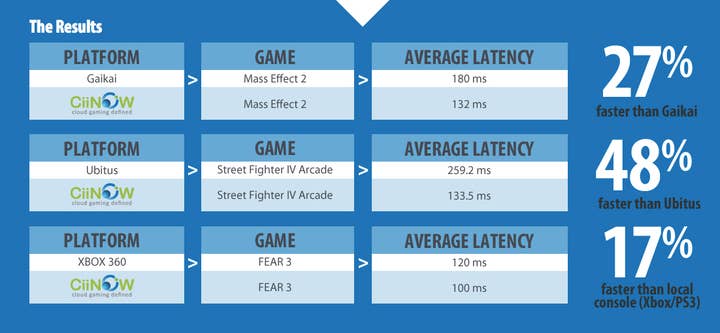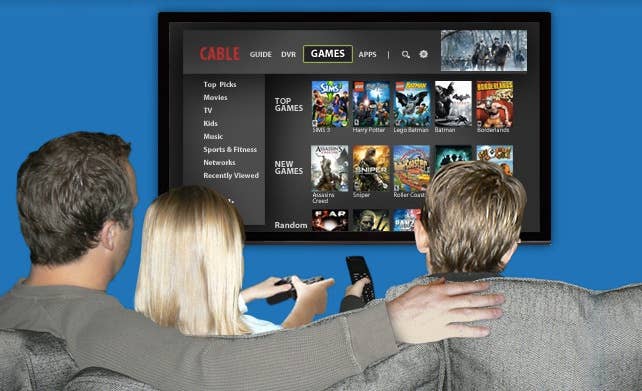CiiNOW: Cloud gaming's tipping point will come this year
We talk to the execs behind the cloud startup and discuss how and why cloud gaming will finally take off
Cloud gaming has yet to really go mainstream. While there are numerous firms out there placing bets on the emerging technology, none as of yet has truly been able to leverage the market on a grand scale. That's all about to change in 2013, according to cloud gaming startup CiiNOW, and needless to say, the founders of the company are optimistic that CiiNOW will be the one to finally make cloud gaming a reality for the average consumer.
CiiNOW was founded in 2010, but it wasn't until last year that the ball really started rolling with major funding from Alcatel-Lucent and AMD and the formation of the CiiNOW Cloud Gaming Platform. CiiNOW believes its biggest advantage is its super low latency. In fact, the company's founders believe that the idea that lag is a big problem for cloud gaming is nothing more than a myth now.
CiiNOW has trials ongoing with operators now (2 in Europe, 2 in the US, 2 in Korea, 1 in Australia and 1 in New Zealand) and latency measurements conducted on live servers have shown that the platform not only has better latency results than Sony's Gaikai, but the service is even better than a local console connected directly to an HDTV.

Note: CiiNOW sent along the following clarification: Mass Effect 2 is an Electronic Arts title and was used for the purposes of CiiNOW's latency testing only. The game is not part of any CiiNOW field trials, nor is it available on a CiiNOW powered service at this time.
Ron Haberman, CEO and co-founder of CiiNOW, tells GamesIndustry International that OnLive's business struggles shouldn't be seen as a sign of trouble for the market, and that CiiNOW's approach means it doesn't have to worry about the challenge of customer acquisition.
"The one thing OnLive did, and Gaikai as well, is prove that the technology is viable, that you can have a compelling experience via cloud gaming. So all the arguments against latency and that it's against the laws of physics, and everything else, were proven wrong. OnLive's problem was that they tried to take too much of a bite of the apple by building their own proprietary platform and having to do customer acquisition. Everything else was set up for failure," he says. "I'll argue that Microsoft's Xbox experiment to date, which is somewhere in the $9 billion range, almost all those costs are customer acquisition costs, and they are still not the leader. One of the biggest differences we have is we partner with companies that already have an existing billing relationship with millions of customers."
"At the end of the day, what the gamers are most interested in is the games and there just hasn't been compelling enough content on most services"
Makarand Dharmapurikar
"And if you think about it from the cable operator perspective, their audience isn't growing significantly; they've got people that join and others that leave, and at least in North America they are more territorially restricted. You've got Time Warner in some places, Comcast in others, Cox and whatever... but all of them offer pretty much the same product. They monetize users well and make a good amount of money per month, but they are not increasing that business significantly and that's one of the things gaming can do - a way for them to offer another service that can generate additional revenue. And that's another thing OnLive didn't do well with, identifying who the actual customer is."
"Around 50 percent of the US owns consoles while 75-80 percent plays games... so the simple fact is it's a really compelling proposition for the service providers to have a logo or icon or something that says gaming on the person's television when they fire it up. You already have a billing relationship with the customer so the friction is lowered even more," Haberman continues. "It's also important to have something more than what the customer has already seen with set-top box titles, like match three puzzle games, or Tetris, or just low quality products. Offering them a full console-like experience has a lot of these guys really excited to see the potential. There are roughly 237 million people in the world who own consoles, but there's about 6.8 billion people in the world. Not all of them have great bandwidth yet but they will. Those are the guys I think we can make customers out of."
The customer acquisition problem is perhaps the biggest one for cloud firms, but by partnering with cable companies or others who already have solid billing relationships, cloud gaming companies might finally elevate the market to the next level. Makarand Dharmapurikar, CTO and Co-Founder of CiiNOW, definitely sees 2013 as cloud gaming's "tipping point."
"I think the tipping point for cloud gaming is definitely going to be this year. There are two components to it. One is the cost of acquisition - that component hasn't really been cracked yet and I think the cable firms and telcos are in the best position to give you access to gaming on the screen you're already on. You don't have to change HDMI inputs, you're on the grid looking for something to watch, you then click another button and you're in a game," he tells us. "The second thing is the content itself; it's very important to start distributing better content that attracts gamers to whatever platform it is. At the end of the day, what the gamers are most interested in is the games and there just hasn't been compelling enough content on most services. I think that's something Chris [Donahue] is cracking."

Donahue, who comes from OnLive and serves as CiiNOW's vice president of marketing and publisher relations, is tasked with signing publishers to the cloud platform. As the saying goes, content is king, and OnLive certainly could have benefited from more day-and-date releases with retail.
"You could say OnLive would have been more successful and would've generated more customers if they had every single new game that came out, but I think we ended up doing pretty well and what we and Gaikai did was educate publishers and customers and soften up this market," he says. "So now they see it as a pretty good opportunity. If I can go to them and say this provider has 7 million users that they already have a billing relationship with, and we know for a fact that less than 30 percent of them own consoles, so you've got a 70 percent opportunity here to sell games into this other marketplace, those add up quickly into a significant number."
"The barrier to entry in playing consoles games is pretty steep - it's around 500 bucks...We reduce that to almost zero"
Chris Donahue
While the CiiNOW website currently lists games that are somewhat old, Donahue notes that this is a "strategic decision" to not show his hand to the competition. There will be some announcements with publishers soon, and "We're pretty well set for a really large amount of great new content. I'm making deals with publishers and Ron and his team are making deals with service providers."
Donahue believes that cloud gaming may represent a much bigger opportunity for the industry than consoles, because the barrier to entry is potentially much, much lower. "We're really focused on making cloud gaming a viable business that's going to open high quality console class gaming to a much broader audience than it is right now. The barrier to entry in playing consoles games is pretty steep - it's around 500 bucks. When new consoles come out, you have to factor in the box, extra controllers, cables, the games and any other accessories. We reduce that to almost zero," he says.
He adds, "The controller conundrum [for cloud gaming] is definitely a challenge but working with some of the providers we're talking about, it's no different than the business model for consoles where once they get in your living room the attach rate means you're going to buy games. Getting a controller into people's hands we believe will get them to pay for more games on a service." The CiiNOW platform will work with any PC controller and will support Bluetooth as well.
While consoles typically attract a hardcore audience, the market opportunity in the cloud is somewhat broader. Donahue sees many lapsed gamers finally returning to the hobby they loved years back.
"The way people play on cloud gaming I think is different from how they play on consoles. Consoles are filled with hardcore guys who want to sit down and play through every single mode on Call of Duty and get all of the achievements and stuff, whereas these guys are more like 'new core' which I think is people who maybe used to have a console - maybe an N64 or something - and then they got married and had kids and got a job and the wife doesn't want a console in the living room but this is a real easy way to get them back into gaming," he describes.
It's an interesting proposition for sure. But telcos and cable companies aren't the only targets. CiiNOW's cloud could potentially give platforms like Valve's Steam or EA's Origin another way to offer products. "Our technology would lend itself very nicely to that. We are in no way in competition with them; we are a pure technology provider and could empower that side of the business for them. Pretty much anything that can decode a YouTube stream is compatible with our system, so we will get onto more and more devices," Dharmapurikar says.
And cloud gaming doesn't necessarily mean the end of digital downloads or retail (at least not yet). "We don't think this [tipping point] is going to happen in one day or be a 'one or the other' decision for the user. One of the interesting things in our new deal with Metaboli/GameTap is that you can be a customer that's used to downloading things to your PC and you can continue to do that, but the new package is a combination of downloads and streaming. So you can download and stream via dongle to your TV, or you can log on at a friend's house and just stream your game from there. I think it's going to ease the transition that users can continue to do what they're used to, and start expanding from there," notes Dharmapurikar.
It will be interesting to see just how far cloud gaming will advance this year. CiiNOW expects to announce some major partnerships in the next month or so.

